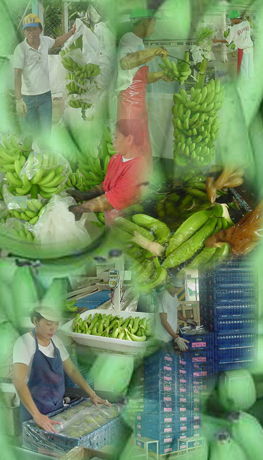





A Member of the JVA Group
TriStar Group of Banana Companies
All rights reserved 2007
v3.02
Welcome To Tristar Group of Banana Companies Official Website
RIENDLY BANANA is grown in the lowland area and is produced and exported by Vizcaya Plantation, Inc. It is a specialty banana that is now considered one of the most sought-after fruits in the Japan market. With the Japanese consumers' growing awareness on health issues and with the advent of organically grown fruits in the global market, several initiatives were made to reduce

n the early ‘90s, the TriStar Group was part of a composite team – composed of Japanese banana importer, ripener/processor and retailer – that was commissioned to develop a special type of banana that is safe to eat for our discriminating customers. The objective of the search then was FOOD SAFETY. Starting from a small-sized farm, aggressive research work was put into motion. Years of commercially tested banana cultural practices were challenged. Some field operations shifted back focus to more manual operations.
espite all these uncertainties, the first shipment of FRIENDLY BANANAS sailed from Davao to Kobe , Japan in October of 1993. The name “FRIENDLY” was adopted and meant to announce that this special type of bananas is “friendly” to the environment, “friendly” to the people involved with its production an processing and definitely a “friend” to our customers. Aided with sheer determination and undying persistence, today, FRIENDLY BANANAS has a 10-year track record of delivering safe bananas to our loyal consumers in Japan . We are also proud and happy to say that the FRIENDLY BANANA is now considered one of the most sought-after fruits in the Japan market, especially in the Kansai region. Commercial production of FRIENDLY BANANAS , however, is a capital, labor and technically-intensive business venture.
Friendly Banana
significantly the dependence on synthetic chemicals and fertilizers, and more emphasis is given on the use of biological and cultural approaches in the management of pest and diseases (integrated pest management) as well as improving soil structure and fertility by applying more organic fertilizers.

* Will “less-chemical” bananas be acceptable to the market?
* Are the new technologies adaptable to a commercial-sized operation?
* What if there is a disease breakout?
ew and more innovative pest management techniques were tried out. Serious attention was given to the soil's organic deposits. All of these new processes were geared toward attaining a significant reduction of dependence on the use of synthetic chemicals, pesticides, inorganic fertilizer and other farm inputs. The initial results were encouraging but other issues need to be answered, questions like:











